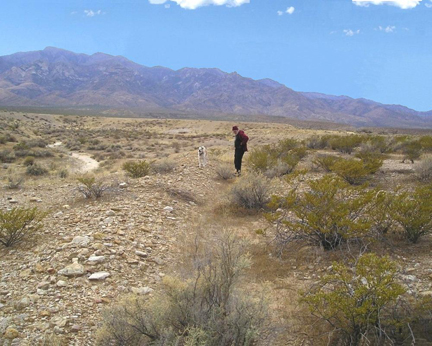Donald “Don” Lancaster ’61 is credited as one of the fathers of the personal computer based on his invention of the TV typewriter featured in Radio-Electronics magazine in 1973. He is the author of 45 books on a wide variety of scientific and popular topics, including two million-sellers, and more than 2,000 technical papers.
For the past four years, he’s been studying the system of ancient irrigation canals carved in the foothills of eastern Arizona. His work was recently featured in USA Today.

Don Lancaster ’61 in the wilderness near his home in Thatcher, Arizona
Trekking frequently through the wilderness near his home in Thatcher, Ariz., where he has lived for more than 30 years, he looks for caves or pockets of rainwater known as tinajas. On these walks, he became intrigued by unusual contours of stone and soil snaking out of high canyons. The canals, which look like ditches carved into the hillside, are about one yard wide and angle downward. Lancaster calls them “hanging canals.”
Visit his tinajas website
Lancaster collaborates with James A. Neely, professor emeritus of anthropology, University of Texas-Austin, an expert on ancient irrigation systems of the Southwest, Mexico, and Iran. They believe there are 21 distinct networks involving at least 40 miles of canals built by a highly developed society nearly 1,000 years ago. An extensive report on their findings was published in The Arizona Republic.
Lancaster was prepared to succeed by what believes to be one of the most outstanding undergraduate electrical engineering programs.
“Certainly one of the most profound and influential faculty members during my time there was the legendary Finley Smith, associate professor of electrical engineering,” he says. “Moving on to a major university for my graduate work was definitely a rude awakening.”
Lancaster is referring to the loss of small class sizes, intense interaction, obvious competence, strong sense of community, and the “genuine motivation and caring that clearly defined the outstanding hallmarks of the Lafayette faculty, without exception.”
An electrical engineering graduate, he holds a master’s from Arizona State University. During graduate school and afterward, he worked for Goodyear Aerospace Corp.
